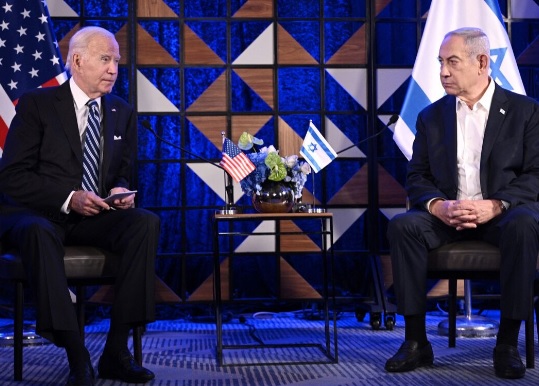On the preceding Saturday, amidst the lingering shock caused by the lethal assault executed by Hamas a week prior, the military authorities announced their intention to execute “coordinated strikes from the air, sea, and land” in order to eliminate the group in Gaza. However, as the week progressed, military spokespersons began to suggest that a potential ground offensive may deviate from conventional expectations. They conveyed that it could commence at a later time and endure for a prolonged duration, unfolding in unforeseen manners.
During this interim period, a series of unprecedented visits by esteemed US officials took place, including the secretaries of state and defense, as well as President Joe Biden. Within their expressions of solidarity with Israel’s anguish following the most devastating attack in recent history, they also conveyed a message of prudence regarding the appropriate course of action to undertake. This message was accompanied by pledges to dispatch warships and weaponry. The US shares Israel’s objective of dismantling Hamas’s military infrastructure in Gaza, a task that necessitates a ground invasion due to the extensive network of tunnels and other fortifications built by the designated terrorist organization over several decades.
However, the US’s involvement is already shaping the approach to this assault, particularly in terms of minimizing civilian casualties among the two million residents of Gaza. Israeli officials and individuals close to the government reveal that the US’s influence extends beyond the conduct of the operation itself, encompassing post-conflict planning as well. According to three senior Israeli officials who spoke on the condition of anonymity, the role and impact of the US in this conflict against Hamas surpasses any previous exertions by Washington.
The United States has expressed growing apprehension regarding the potential involvement of Iran-backed Hezbollah in Israel’s invasion. Such a development could result in the initiation of a second front in the ongoing conflict, thereby igniting a more extensive confrontation that would further entangle the United States and undermine the Biden administration’s endeavors to establish stability in the region through the facilitation of peace between Israel and significant Arab nations.
In an interview, Foreign Minister Eli Cohen emphasized President Biden’s primary objective of minimizing the likelihood of this war expanding to additional fronts. Prime Minister Benjamin Netanyahu announced following President Biden’s visit that a comprehensive agreement had been successfully achieved, marking a significant milestone in fostering collaboration that will undoubtedly reshape the dynamics across all arenas. During their return journey to Washington aboard Air Force One, President Biden disclosed engaging in discussions with Israeli officials regarding potential “alternatives” to address the ground war, driven by the imperative to mitigate civilian casualties and prevent further escalation of the conflict.


